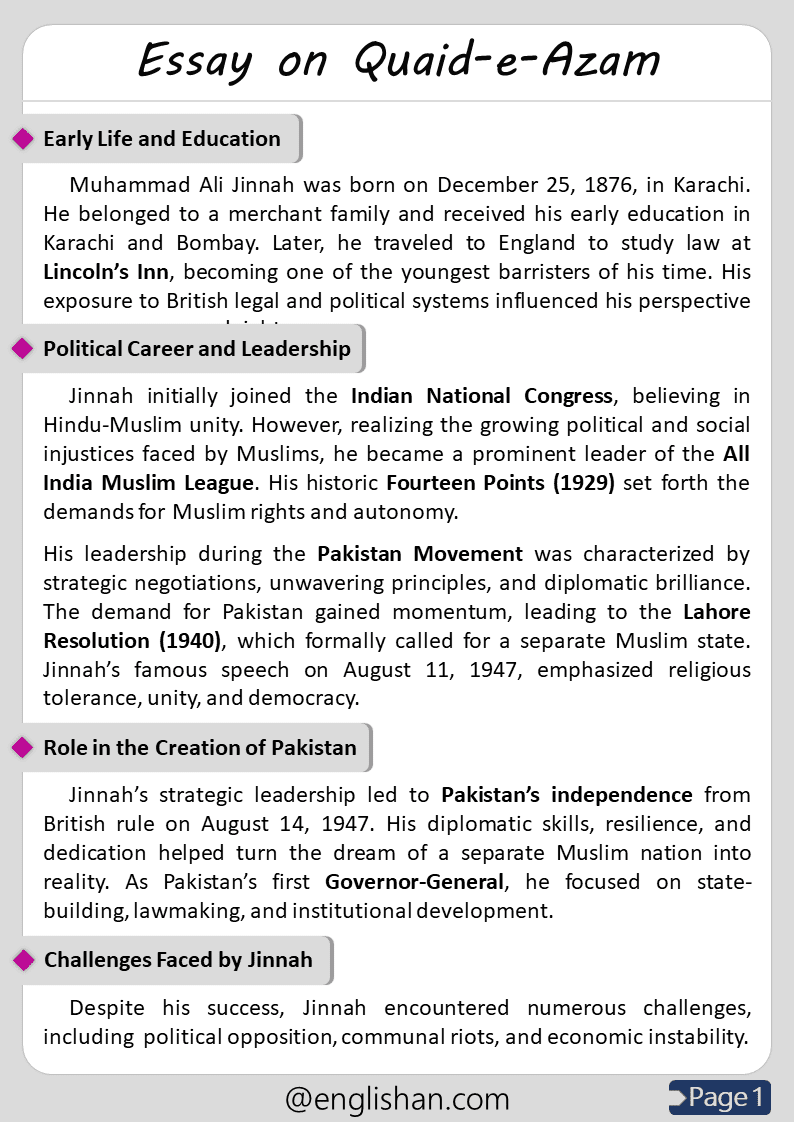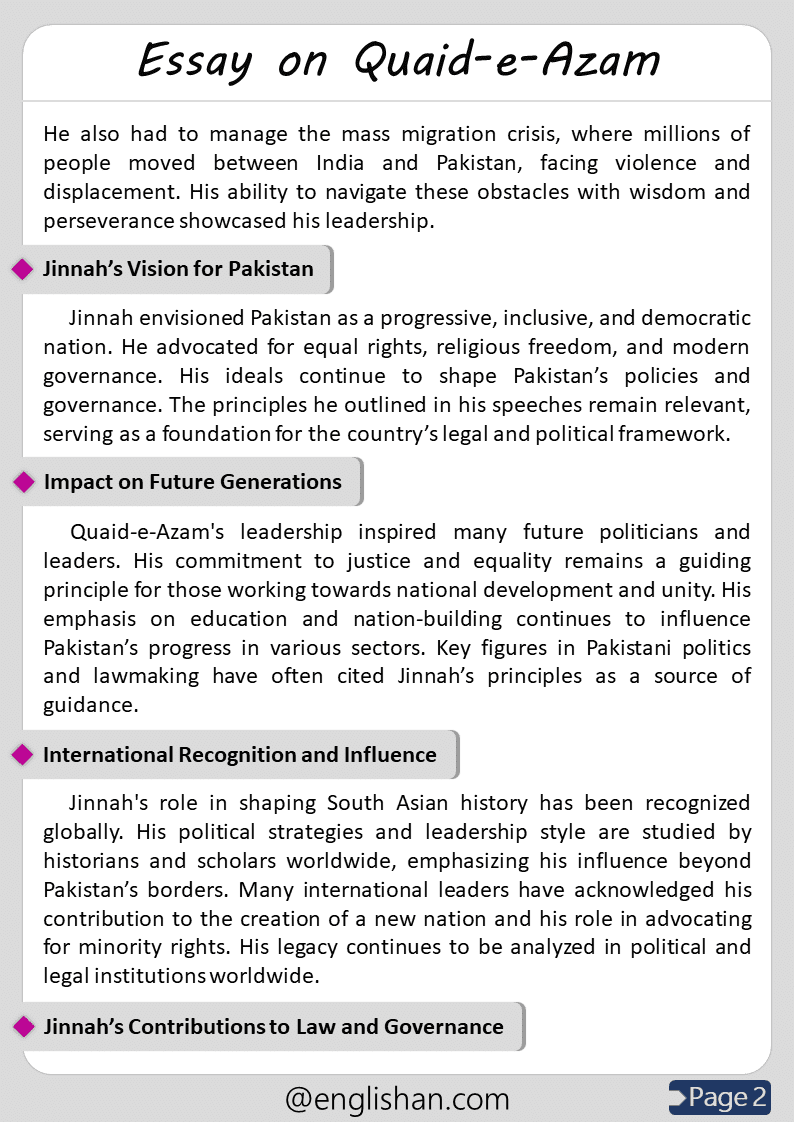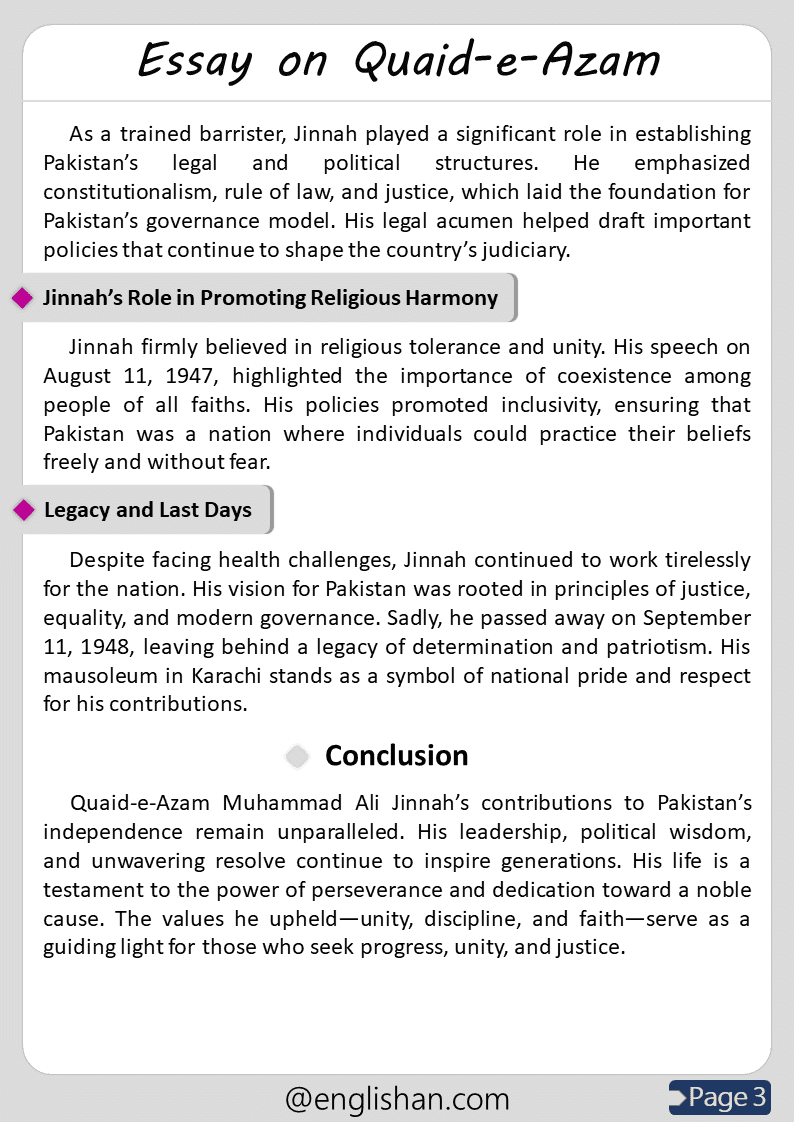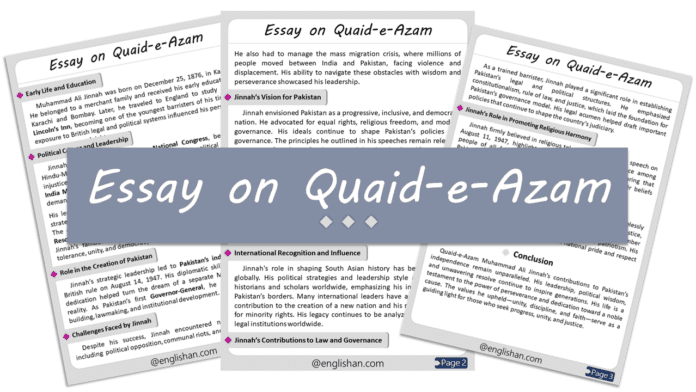Contents
This article is a 500-word essay on Quaid-e-Azam Muhammad Ali Jinnah, the visionary leader who led the struggle for Pakistan’s independence. His unwavering determination and political acumen laid the foundation of a separate nation for Muslims. This essay highlights his early life, leadership, contributions, and legacy. Download the free printable PDF and image versions for easy access. Visit our Essay Writing category here: Essay Writing.
Early Life and Education
Muhammad Ali Jinnah was born on December 25, 1876, in Karachi. He belonged to a merchant family and received his early education in Karachi and Bombay. Later, he traveled to England to study law at Lincoln’s Inn, becoming one of the youngest barristers of his time. His exposure to British legal and political systems influenced his perspective on governance and rights.
Political Career and Leadership
Jinnah initially joined the Indian National Congress, believing in Hindu-Muslim unity. However, realizing the growing political and social injustices faced by Muslims, he became a prominent leader of the All India Muslim League. His historic Fourteen Points (1929) set forth the demands for Muslim rights and autonomy.
His leadership during the Pakistan Movement was characterized by strategic negotiations, unwavering principles, and diplomatic brilliance. The demand for Pakistan gained momentum, leading to the Lahore Resolution (1940), which formally called for a separate Muslim state. Jinnah’s famous speech on August 11, 1947, emphasized religious tolerance, unity, and democracy.
Role in the Creation of Pakistan
Jinnah’s strategic leadership led to Pakistan’s independence from British rule on August 14, 1947. His diplomatic skills, resilience, and dedication helped turn the dream of a separate Muslim nation into reality. As Pakistan’s first Governor-General, he focused on state-building, lawmaking, and institutional development.

Challenges Faced by Jinnah
Despite his success, Jinnah encountered numerous challenges, including political opposition, communal riots, and economic instability. He also had to manage the mass migration crisis, where millions of people moved between India and Pakistan, facing violence and displacement. His ability to navigate these obstacles with wisdom and perseverance showcased his leadership.
Jinnah’s Vision for Pakistan
Jinnah envisioned Pakistan as a progressive, inclusive, and democratic nation. He advocated for equal rights, religious freedom, and modern governance. His ideals continue to shape Pakistan’s policies and governance. The principles he outlined in his speeches remain relevant, serving as a foundation for the country’s legal and political framework.
Impact on Future Generations
Quaid-e-Azam’s leadership inspired many future politicians and leaders. His commitment to justice and equality remains a guiding principle for those working towards national development and unity. His emphasis on education and nation-building continues to influence Pakistan’s progress in various sectors. Key figures in Pakistani politics and lawmaking have often cited Jinnah’s principles as a source of guidance.
International Recognition and Influence
Jinnah’s role in shaping South Asian history has been recognized globally. His political strategies and leadership style are studied by historians and scholars worldwide, emphasizing his influence beyond Pakistan’s borders. Many international leaders have acknowledged his contribution to the creation of a new nation and his role in advocating for minority rights. His legacy continues to be analyzed in political and legal institutions worldwide.

Jinnah’s Contributions to Law and Governance
As a trained barrister, Jinnah played a significant role in establishing Pakistan’s legal and political structures. He emphasized constitutionalism, rule of law, and justice, which laid the foundation for Pakistan’s governance model. His legal acumen helped draft important policies that continue to shape the country’s judiciary.
Jinnah’s Role in Promoting Religious Harmony
Jinnah firmly believed in religious tolerance and unity. His speech on August 11, 1947, highlighted the importance of coexistence among people of all faiths. His policies promoted inclusivity, ensuring that Pakistan was a nation where individuals could practice their beliefs freely and without fear.
Legacy and Last Days
Despite facing health challenges, Jinnah continued to work tirelessly for the nation. His vision for Pakistan was rooted in principles of justice, equality, and modern governance. Sadly, he passed away on September 11, 1948, leaving behind a legacy of determination and patriotism. His mausoleum in Karachi stands as a symbol of national pride and respect for his contributions.
Conclusion
Quaid-e-Azam Muhammad Ali Jinnah’s contributions to Pakistan’s independence remain unparalleled. His leadership, political wisdom, and unwavering resolve continue to inspire generations. His life is a testament to the power of perseverance and dedication toward a noble cause. The values he upheld—unity, discipline, and faith—serve as a guiding light for those who seek progress, unity, and justice.

Difficult Words Used in Quaid-e-Azam Muhammad Ali Jinnah
| Word | Meaning |
|---|---|
| Visionary | A person with original and forward-thinking ideas |
| Autonomy | The right of self-governance |
| Diplomatic | Skilled in negotiations and politics |
| Resilience | The ability to recover from difficulties |
| Legacy | Something handed down from the past |
Download PDF
You May Also Like






